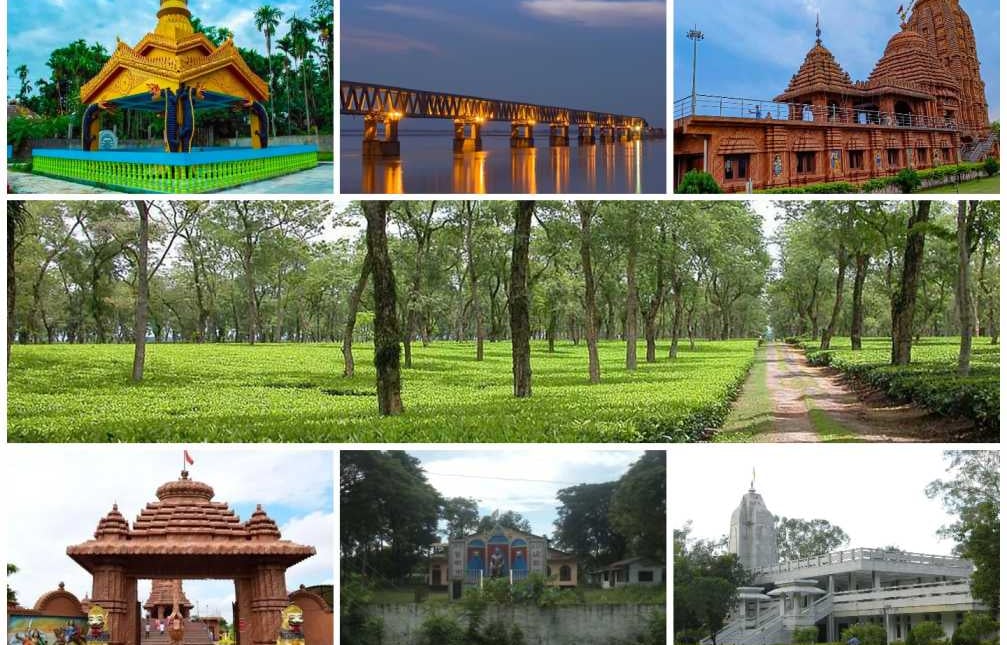Dibrugarh, Assam: Tea Gardens, Wildlife & Culture
Journey to Dibrugarh, the "Tea City of India," in Assam. Find out why it's famous, when to go, what to see, and how to budget for an unforgettable cultural and nature escape.
ASSAM


Settled on the banks of the mighty Brahmaputra River, Dibrugarh in Assam is a captivating destination often hailed as the "Tea City of India." But this vibrant city offers far more than just lush tea gardens. It's a blend of natural beauty, rich cultural heritage, historical significance, and a haven for wildlife enthusiasts and foodies alike.
If you're looking for an authentic Northeast Indian experience, Dibrugarh is a must-visit.
Why is Dibrugarh Famous?
Dibrugarh holds several distinctions that contribute to its fame:
The Tea City of India: This is perhaps its most prominent identity. Dibrugarh is the largest tea-producing district in India, with sprawling tea estates covering vast expanses. The city is a major hub for tea processing, packaging, and export, playing a crucial role in India's tea industry. Its unique climate and fertile soil contribute to the production of high-quality Assam tea, renowned globally for its strong, malty flavor.
Gateway to Eastern Arunachal Pradesh and Nagaland: Its strategic location makes it a vital entry point for travelers heading to the scenic and culturally rich states of Arunachal Pradesh and Nagaland, which lie further east.
A Major Industrial and Commercial Hub: Beyond tea, Dibrugarh is an important industrial and commercial center in Upper Assam. It's home to oil and natural gas industries, power plants, and other manufacturing units, contributing significantly to the region's economy.
Educational and Medical Center: Dibrugarh boasts Dibrugarh University, one of the premier educational institutions in Northeast India, along with Assam Medical College, a well-regarded medical facility, making it a significant center for education and healthcare in the region.
Rich Biodiversity and Wildlife: The surrounding areas of Dibrugarh are treasure troves of biodiversity, with national parks and wildlife sanctuaries protecting unique flora and fauna, including some endangered species.
Best Time to Visit Dibrugarh
The ideal time to explore Dibrugarh is from October to March. During these months, the weather is pleasantly cool and comfortable, with temperatures ranging from 10°C to 25°C. This is the peak season, perfect for sightseeing, strolling through tea estates, and enjoying outdoor activities. Expect larger crowds at popular attractions and potentially higher accommodation rates.
The monsoon season (June to September) brings lush greenery but also heavy rainfall, which might disrupt travel plans. While the landscape is stunning, some outdoor activities might be limited. April to May can be hot and humid, but offers fewer crowds and potentially lower prices, making it a good option for budget travelers.
Unveiling Dibrugarh's Charms: Things to See & Do
Dibrugarh boasts a diverse range of attractions that cater to every traveler's interest:
1. The Verdant Tea Gardens:
No trip to Dibrugarh is complete without immersing yourself in its iconic tea gardens. Take a guided tour through sprawling plantations like the Mancotta Tea Estate or simply wander through the Dibrugarh Tea Gardens. Learn about the tea production process, from plucking to packaging, and indulge in a fresh tea tasting session. Many estates also offer the chance to stay in colonial-era bungalows, providing a unique and serene experience.
2. Wildlife & Nature Escapes:
For nature lovers, Dibrugarh is a gateway to incredible biodiversity.
Dehing Patkai Wildlife Sanctuary: Often called the "Amazon of the East," this tropical rainforest paradise is home to diverse flora and fauna, including rare and endangered species. It's a fantastic spot for wildlife spotting and birdwatching. (Timings: 7 AM to 5 PM).
Dibru Saikhowa National Park: Situated at the confluence of the Brahmaputra and Lohit rivers, this biodiversity hotspot is unique for its semi-evergreen forests, grasslands, and wetlands, offering opportunities for boat safaris and spotting wild horses.
Jeypore Rainforest: Another mesmerizing natural habitat in the Dibrugarh district, perfect for those seeking to explore dense forest ecosystems.
Jokai Botanical Garden and Germplasm Centre: A must-visit for botany enthusiasts, featuring a wide array of rare and medicinal plants, along with a charming butterfly park. (Timings: 8 AM to 4 PM).
3. Spiritual & Historical Sites:
Dibrugarh's rich history is reflected in its ancient temples and monuments.
Shri Jagannath Temple: A beautiful replica of the famous Puri Jagannath Temple, offering a spiritual and serene experience. (Timings: 6 AM to 8 PM).
Radha Krishna Mandir: Known for its stunning architecture and peaceful ambiance. (Timings: 6 AM to 8 PM).
Namphake Buddhist Monastery: Located in Namphake Village, this Buddhist monastery offers a glimpse into the Tai Phake community's culture and traditions. (Timings: 7 AM to 6 PM)
Maidams (Ahom Burial Mounds): Explore historical sites like Barbarua Maidam, Lekai Chetia Maidam, and Bormechow and Sarumechlow Maidams, which are ancient burial grounds of Ahom royalty and warriors, showcasing Assam's rich past.
(Barbarua Maidam Timings: 8 AM to 6 PM).
Raidongia Dol: An ancient monument representing the glorious Ahom dynasty. (Timings: 6 AM to 7 PM).
4. The Mighty Brahmaputra River:
The Brahmaputra plays a significant role in Dibrugarh's landscape and lifestyle. Enjoy a leisurely evening at the Brahmaputra River Front for picturesque sunsets or, for the adventurous, experience the thrill of white-water rafting on the mighty river. Don't miss a visit to the Bogibeel Bridge, India's longest rail-cum-road bridge, offering striking architecture and panoramic views.
A Taste of Assamese Culture & Cuisine
Dibrugarh's culture is a fascinating blend of traditional Assamese values and modern influences. The city comes alive during festivals, especially the vibrant Bihu Festival (Rongali Bihu in April, Bhogali Bihu in January), where you can witness energetic Bihu dance performances and traditional music. Other festivals like Durga Puja and Diwali are also celebrated with great enthusiasm.
When it comes to food, Dibrugarh offers a culinary journey through authentic Assamese flavors. Assamese cuisine is known for its subtle use of spices, emphasis on fresh ingredients, and unique cooking techniques.
Must-try dishes include:
Masor Tenga: A tangy fish curry, light and flavorful, often prepared with tomatoes, elephant apple, or local lemons.
Khaar: A unique alkaline dish made from raw papaya, pulses, or even meat, with a distinct smoky flavor from banana peel ashes.
Baanhgajor Lagot Kukura: A delicious chicken curry cooked with bamboo shoots.
Ou Khatta: A sweet and sour chutney made from elephant apple and jaggery.
Pitha: Traditional Assamese rice cakes, often sweet and stuffed with jaggery or coconut.
Duck Meat Curry (Haah Kumura): A popular delicacy, especially during colder months, often cooked with ash gourd.
Pitika: Various mashed vegetable or fish preparations, flavored with mustard oil, green chilies, and coriander.
You can savor these delicacies at local eateries like Mambooz Dhaba and Moung Phi Dhaba, or explore multi-cuisine options at places like Eat Repeat and Moti Mahal Delux Tandoori Trail.
Shopping in Dibrugarh
Explore the local markets for a glimpse into daily life and to pick up souvenirs. New Market, Graham Bazaar, and Amolapatty Market offer a variety of goods, from clothing and household items to fresh produce and local spices. Dibrugarh is also known for its handicrafts, chappals (sandals), and pickles.
Getting There & Around
Dibrugarh is well-connected by air, rail, and road. The Dibrugarh Airport (DIB) offers flights to major Indian cities. The city has two railway stations, Dibrugarh Town (DBRT) and the newer Dibrugarh station (DBRG), with the Rajdhani Express originating and terminating here. Within the city, cycle rickshaws and auto-rickshaws are readily available and affordable modes of transport.
Planning Your Dibrugarh Trip: Timing and Budget
Recommended Duration:
2-3 Days: This is generally sufficient to cover the main attractions in and around Dibrugarh, including a tea garden visit, a couple of religious/historical sites, and some time by the Brahmaputra. This allows for a quick but fulfilling glimpse into the city.
3-4 Days: If you wish to delve deeper into the wildlife sanctuaries like Dehing Patkai or Dibru Saikhowa, or spend more leisurely time in the tea estates and explore local villages, a 3–4-day trip is recommended. This also gives you more flexibility to account for travel time to some of the farther-flung nature spots.
Estimated Budget (per person, per day, excluding flights):
Dibrugarh can be a relatively affordable destination, especially if you opt for budget-friendly accommodations and local food.
Budget Traveler (₹1,500 - ₹2,500):
Accommodation: Homestays or basic guesthouses (₹500 - ₹1,000 per night). You can find some budget hotels starting from around ₹500.
Food: Eating at local dhabas and eateries (₹300 - ₹600 per day).
Transportation: Relying on auto-rickshaws, cycle rickshaws, or shared transport for local sightseeing (₹200 - ₹400 per day).
Activities: Entry fees to basic attractions (₹100 - ₹300 per day).
Mid-Range Traveler (₹2,500 - ₹5,000):
Accommodation: Mid-range hotels or comfortable guesthouses (₹1,000 - ₹2,500 per night).
Food: A mix of local restaurants and slightly more upscale dining (₹600 - ₹1,200 per day).
Transportation: Hiring private taxis for specific day trips or longer distances, local auto-rickshaws for within the city (₹500 - ₹1,000 per day).
Activities: Entry fees to all major attractions, possibly a tea estate tour with tasting (₹300 - ₹700 per day).
Luxury Traveler (₹5,000+):
Accommodation: Boutique hotels, tea estate bungalows, or premium hotels (₹2,500+ per night).
Food: Dining at upscale restaurants, trying specialized Assamese cuisine experiences (₹1,200+ per day).
Transportation: Dedicated private car with driver for the entire trip (₹1,500+ per day).
Activities: Customized tours, private wildlife safaris, exclusive tea tasting experiences (₹700+ per day).
Tips to save money:
Travel during the shoulder or off-season (April-May or parts of the monsoon) for better deals on accommodation.
Eat at local eateries and street food stalls for authentic and affordable meals.
Utilize public transport or shared auto-rickshaws for getting around.
Book accommodations in advance, especially during peak season.
Dibrugarh, with its tranquil tea gardens, fascinating wildlife, rich heritage, and delectable cuisine, offers a truly authentic and memorable experience in the heart of Assam. So, pack your bags and get ready to discover the charm of the "Tea City of India"!
Read also: Top 10 Places in Assam
